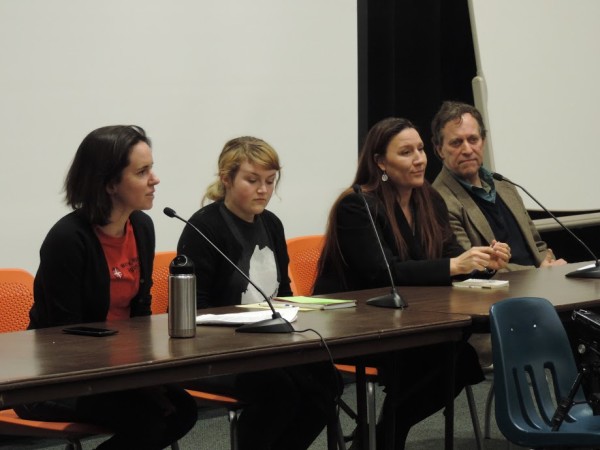
On March 3, 2016, the volunteer-led organization and the state of Maine amalgamate of the group National Peace Action, Peace Action Maine (a local collective with more than twenty-five “years of grassroots mobilizing to end war and occupation and to abolish nuclear weapons,” according to their website peaceactionme.org) presented a live-streaming video conference featuring Bill McKibben, titled “Creating a Climate of Peace.” The conference took place in Talbot Hall on the University of Southern Maine campus at 7:00 P.M. Free and open to the public, “Creating a Climate of Peace” was co-sponsored by the University of Southern Maine Department of Environmental Science and Policy.
The conference members included Meaghan LaSala, of Divest UMaine and the Southern Maine Workers Center; Iris SanGiovanni, of Maine Students for Climate Justice and Protect South Portland; Sherri Mitchell, Executive Director of the Land Peace Action Foundation and indigenous rights lawyer; Chloe Maxin, of Divest Harvard who is also writing a book on climate change for The Nation; Lee Chisholm of the Greater Portland division of 350.org; and the keynote speaker Bill McKibben, founder of 350.org, environmental activist, and author of Eaarth. However, due to an unavoidable obligation, Chloe Maxin was unable to attend.
When the Chair of the Department of Environmental Science & Policy at the University of Southern Maine Professor Robert M. Sanford was reached by email prior to the event, he pointed out that “this event helps show the connectedness of climate, social unrest, the economy, and sustainability – it is all tied in together. The greatest asset we have to promote stability in the face of change is the energy, strength, and ideas of students and other young people.”
Professor Emeritus Stanley Scott of the University of Southern Maine, who authored Frontiers of Consciousness and is the president of Peace Action Maine, introduced a new member of the Peace Action Maine board, Devon Grayson-Wallace who gave a brief introduction to Bill McKibben before he reached the audience of approximately sixty-five people by satellite. Devin went on to say “In 2006, with seven undergraduate seniors in Middlebury, Vermont, and no money or other resources except insight and courage, Bill McKibben became a principal founder of 350.org, the now illustrious international organization that has coordinated over 15,000 rallies in over 89 countries since 2009, all to raise consciousness of the imminent dangers of climate change.”
After a brief moment of technical difficulty, McKibben discussed the Paris climate talks, that is, the recent United Nations conference on climate change referred to by many as COP21, alongside the way in which climate change relates to world peace.
“It is a great pleasure to join all of you tonight… but today was a tough day. Today we learned that one of the great environmental justice activists in the world, Berta Cáceres of Honduras, was assassinated. She had been working to stop big dam projects and that left her unpopular,” McKibben said after he briefly expressed his thanks to all involved in the climate change movement and in the process of setting up this conference. McKibben went on to discuss the way climate change has caused the worst drought in Syria in recorded history that has contributed to the violence and chaos in the region, how it is incumbent upon on us to end the fossil fuel age now and how we all need to participate in civil disobedience to ensure that oil remains in the ground, because the Koch brothers, among other billionaires, will not stop until every drop of oil is extracted from the ground.
McKibben’s video address was also followed by a question and answer session, as well as a panel discussion, which was led off by Bruce Gagnon of Global Network Against Weapons and Nuclear Power in Space.
The question a student was able to raise to McKibben was put forth as follows: “You said that there was some progress made through the COP21 agreements, however, as you know, those agreements aren’t binding, legally… how can we enforce these agreements so they actually happen?” McKibben responded by saying that “they are not going to be legally binding, you need movements to make them real. Look, the reason there is not going to be a binding agreement in Paris, or a binding agreement anytime soon, is because the rest of the world looks at our dysfunctional political system and knows that that is the obstacle.”
Thereafter, the Peace Action Maine Board Director Tina Malcolmson officially introduced the panel members who were able to attend. Meaghan LaSala spoke first, having traveled to the Paris Climate talks as the representative for the Southern Maine Workers Center. LaSala was followed by third year political science major Iris SanGiovanni who spoke about the responsibility of students to face the crisis of anthropogenic climate change in relation to world peace. Finally, Sherri Mitchell and Lee Chisholm elaborated upon the ideological underpinnings that kept change from occurring.
A lively discussion broke out during the question and answer session with the panel. A physicist addressed the need for more technological discussion, alongside the political activism.
Following the conclusion of the conference, McKibben was reached by email, and posed the following question Dexter Morse, a university Panel student studying chemistry and resident of Maine, raised. The first question was concerned with “how do you [Bill] convince people to work against their own self interest to protect the universal human rights – food, shelter, equality, etc – for future generations, when we still do not defend that for our own generation?” McKibben responded by stating that, “I think at this point we’re not acting mostly on behalf of the future, but on behalf of ourselves and our generations. And it needs to be tied in with the broader fight for justice on all fronts. That’s why I like the way Bernie messages it.”
http://usmfreepress.org/2016/03/07/panelists-discuss-impacts-of-climate-change-on-world-conflict/